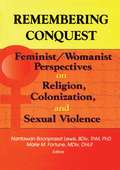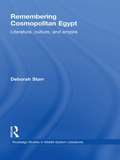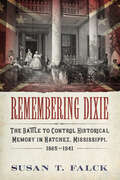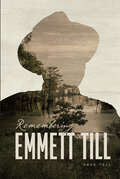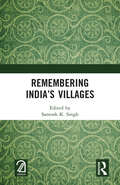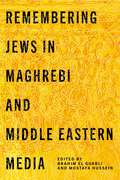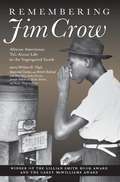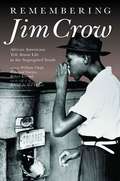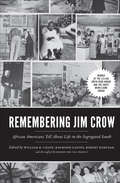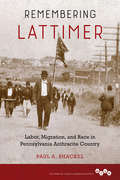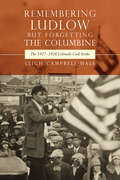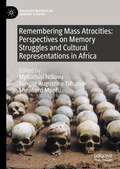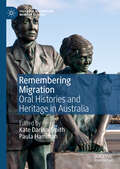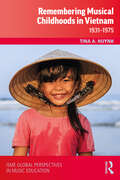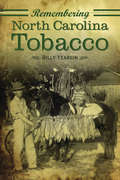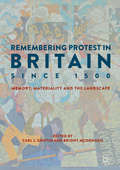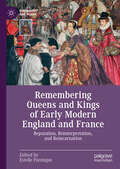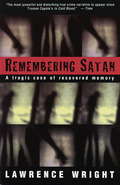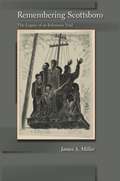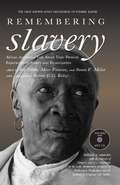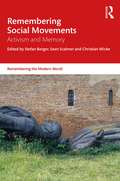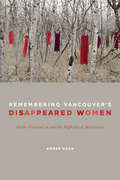- Table View
- List View
Remembering Conquest: Feminist/Womanist Perspectives on Religion, Colonization, and Sexual Violence
by Nantawan B LewisRemembering Conquest: Feminist/Womanist Perspectives on Religion, Colonization, and Sexual Violence addresses the issue of sexual violence against women from feminist and womanist theological perspectives. Taken from proceedings of a panel discussion at the 1998 annual meeting of the American Academy of Religion, this informative book offers sociologists, clergy, and women an examination of how negative stereotypes in society are derived from Christian perspectives and other religions. Exploring abuse against Native American, African- American, Filipino, and Thai women, Remembering Conquest will help you recognize the combination of issues that lead to violence against women. Thorough and compelling, this valuable book will urge you to advocate for change in how religious groups interpret women so that religion can provide a moral and ethical source of equality for women instead of a social barrier.This intelligent book will help you understand the changes that need to be made as you read about numerous atrocities, including: the history of violence experienced by American Indian women during colonization and realizing that prior to this time, sexual violence did not exist in American Indian societies how the United States’colonization of Thailand is directly related to sexual violence today against women, which is expressed in the form of the booming sex industry as well as the AIDS epidemic how poverty in the Philippines has made women and children second-class citizens who must make the ultimate sacrifice and sell their bodies and their souls to surviveRemembering Conquest provides you with a unique religious perspective on the subject of violence against women to enlighten you as to how religion can unknowingly help or hinder a woman’s healing. You will discover how to assist religious communities in rediscovering new interpretations of their faith traditions and become a moral and ethical source of liberation for women, such as holding perpetrators of abuse responsible for their actions and not insinuating that the abuse victim needs to be “helped” by religion in some way. Compelling and informative, Remembering Conquest provides you with ideas to help bring healing and power to women who are suffering injustices by reinterpreting faith traditions.
Remembering Cosmopolitan Egypt: Literature, culture, and empire (Routledge Studies in Middle Eastern Literatures)
by Deborah StarrRemembering Cosmopolitan Egypt examines the link between cosmopolitanism in Egypt, from the nineteenth century through to the mid-twentieth century, and colonialism. While it has been widely noted that such a relationship exists, the nature and impact of this dynamic is often overlooked. Taking a theoretical, literary and historical approach, the author argues that the notion of the cosmopolitan is inseparable from, and indebted to, its foundation in empire. Since the late 1970s a number of artistic works have appeared that represent the diversity of ethnic, national, and religious communities present in Egypt in the nineteenth and early twentieth centuries. During this period of direct and indirect European domination, the cosmopolitan society evident in these texts thrived. Through detailed analysis of these texts, which include contemporary novels written in Arabic and Hebrew as well as Egyptian films, the implications of the close relationship between colonialism and cosmopolitanism are explored. This comparative study of the contemporary literary and cultural revival of interest in Egypt’s cosmopolitan past will be of interest to students of Middle Eastern Studies, Literary and Cultural Studies and Jewish Studies.
Remembering Dixie: The Battle to Control Historical Memory in Natchez, Mississippi, 1865–1941
by Susan T. FalckNearly seventy years after the Civil War, Natchez, Mississippi, sold itself to Depression-era tourists as a place “Where the Old South Still Lives.” Tourists flocked to view the town’s decaying antebellum mansions, hoopskirted hostesses, and a pageant saturated in sentimental Lost Cause imagery. In Remembering Dixie: The Battle to Control Historical Memory in Natchez, Mississippi, 1865–1941, Susan T. Falck analyzes how the highly biased, white historical memories of what had been a wealthy southern hub originated from the experiences and hardships of the Civil War. These collective narratives eventually culminated in a heritage tourism enterprise still in business today. Additionally, the book includes new research on the African American community’s robust efforts to build historical tradition, most notably, the ways in which African Americans in Natchez worked to create a distinctive postemancipation identity that challenged the dominant white structure. Using a wide range of late nineteenth- and early twentieth-century sources—many of which have never been fully mined before—Falck reveals the ways in which black and white Natchezians of all classes, male and female, embraced, reinterpreted, and contested Lost Cause ideology. These memory-making struggles resulted in emotional, internecine conflicts that shaped the cultural character of the community and impacted the national understanding of the Old South and the Confederacy as popular culture. Natchez remains relevant today as a microcosm for our nation’s modern-day struggles with Lost Cause ideology, Confederate monuments, racism, and white supremacy. Falck reveals how this remarkable story played out in one important southern community over several generations in vivid detail and richly illustrated analysis.
Remembering Emmett Till
by Dave TellTake a drive through the Mississippi Delta today and you’ll find a landscape dotted with memorials to major figures and events from the civil rights movement. Perhaps the most chilling are those devoted to the murder of Emmett Till, a tragedy of hate and injustice that became a beacon in the fight for racial equality. The ways this event is remembered have been fraught from the beginning, revealing currents of controversy, patronage, and racism lurking just behind the placid facades of historical markers. In Remembering Emmett Till, Dave Tell gives us five accounts of the commemoration of this infamous crime. In a development no one could have foreseen, Till’s murder—one of the darkest moments in the region’s history—has become an economic driver for the Delta. Historical tourism has transformed seemingly innocuous places like bridges, boat landings, gas stations, and riverbeds into sites of racial politics, reminders of the still-unsettled question of how best to remember the victim of this heinous crime. Tell builds an insightful and persuasive case for how these memorials have altered the Delta’s physical and cultural landscape, drawing potent connections between the dawn of the civil rights era and our own moment of renewed fire for racial justice.
Remembering India’s Villages
by Santosh K. SinghIn the time of agrarian crisis and movement, Remembering India’s Villages centralises the rural India—examining its stubborn past and dynamic present. Departing from the myth of little republics, it sees villages in cinema, development discourses, and debates among the founders of modern India like Gandhi, Nehru, Tagore and Ambedkar. Empirical research, multidisciplinary perspective, and cross-cultural insights are useful aids in this book toward understanding the reality of the rural that comprises structural anomalies and social possibilities. The book remembers India’s villages under the trope of reconstitution rather than disappearance. The book adds to the renewed interest in village studies, rural sociology, development studies, and intellectual history. This book is co-published with Aakar Books. Print edition not for sale in South Asia (India, Sri Lanka, Nepal, Bangladesh, Pakistan and Bhutan)
Remembering Jews in Maghrebi and Middle Eastern Media
by Brahim El Guabli and Mostafa HusseinThis volume examines the cultural legacy of Jewish emigration from the Maghreb and the Middle East in the years following 1948. Drawing on the remarkable cinematic and literary output of the last twenty years, this collection posits loss as a new conceptual framework in which to understand Jewish-Muslim relations. Previous studies of Jewish emigration have followed the mass departure of Jews, but the contributors to this book choose to remain behind and trace the contours of Jewish absence in Maghrebi and Middle Eastern societies. Attuned to loss in this way, the cultural memories of Jewish-Muslim life transcend the narratives of turmoil, taboo, and nostalgia that have dominated Muslim and prevalent scholarly perspectives on Jewish emigration.Read as a whole, the collection affords an uncommon opportunity to mourn and heal through a nuanced reckoning with the absence of Jews from communities in which they had lived for millennia. Its wide geographic reach and interdisciplinary nature will speak both to scholars and lay readers in Amazigh studies, Arabic studies, Middle Eastern studies, Jewish studies, memory studies, and a host of other disciplines.In addition to the editors, the contributors to this volume are Iskandar Ahmad Abdalla, Abdelkader Aoudjit, İlker Hepkaner, Sarah Irving, Stephanie Kraver, Lital Levy, Nadia Sabri, and Lior B. Sternfeld.
Remembering Jim Crow
by Raymond Gavins William Henry Chafe Robert KorstadPublished in association with Lyndhurst Books of the Center for Documentary Studies at Duke University.Remembering Jim Crow: African Americans Tell About Life in the Segregated South is the "viscerally powerful... compilation of firsthand accounts of the Jim Crow era" (Publisher's Weekly). Based on interviews collected by the Behind the Veil Project at Duke University's Center for Documentary Studies, this remarkable book presents for the first time the most extensive oral history ever compiled of African American life under segregation.Men and women from all walks of life tell how their most ordinary activities were subjected to profound and unrelenting racial oppression. Yet Remembering Jim Crow is also a testament to how black southerners fought back against the system--raising children, building churches and schools, running businesses, and struggling for respect in a society that denied them the most basic rights. The result is a powerful story of individual and community survival.Praise for Remembering Jim Crow"A 'landmark book.'" --Publisher's Weekly, "The Year in Books""This is not just an oral history for the South, but for us all. It is a sobering reminder of the mistakes this nation has made, a hopeful reflection on how far we have come." --Kansas City Star
Remembering Jim Crow: African Americans Tell About Life in the Segregated South
by William H. Chafe Robert Corstad Raymond GavinsInterviews with Southern Blacks about their experiences with Jim Crow laws.
Remembering Jim Crow: African Americans Tell About Life in the Segregated South
by William H. Chafe Raymond Gavins Robert KorstadPraised as "viscerally powerful" (Publishers Weekly), this remarkable work of oral history captures the searing experience of the Jim Crow years-enriched by memories of individual, family, and community triumphs and tragedies. In vivid, compelling accounts, men and women from all walks of life tell how their day-to-day lives were subjected to profound and unrelenting racial oppression. At the same time, Remembering Jim Crow is a testament to how black Southerners fought back against the system-raising children, building churches and schools, running businesses, and struggling for respect in a society that denied them the most basic rights. The result is a powerful story of individual and community survival and an important part of the American past that is crucial for us to remember.Based on interviews collected by the Behind the Veil Project at Duke University's Center for Documentary Studies, this landmark in African American oral history is now available in an affordable paperback edition and, for the first time, as an e-book with audio.
Remembering Lattimer: Labor, Migration, and Race in Pennsylvania Anthracite Country (Working Class in American History #288)
by Paul A. ShackelOn September 10, 1897, a group of 400 striking coal miners--workers of Polish, Slovak, and Lithuanian descent or origin--marched on Lattimer, Pennsylvania. There, law enforcement officers fired without warning into the protesters, killing nineteen miners and wounding thirty-eight others. The bloody day quickly faded into history. Paul A. Shackel confronts the legacies and lessons of the Lattimer event. Beginning with a dramatic retelling of the incident, Shackel traces how the violence, and the acquittal of the deputies who perpetrated it, spurred membership in the United Mine Workers. By blending archival and archaeological research with interviews, he weighs how the people living in the region remember--and forget--what happened. Now in positions of power, the descendants of the slain miners have themselves become rabidly anti-labor and anti-immigrant as Dominicans and other Latinos change the community. Shackel shows how the social, economic, and political circumstances surrounding historic Lattimer connect in profound ways to the riven communities of today. Compelling and timely, Remembering Lattimer restores an American tragedy to our public memory.
Remembering Ludlow but Forgetting the Columbine: The 1927-1928 Colorado Coal Strike (Mining the American West)
by Leigh Campbell-HaleMining the American West Remembering Ludlow but Forgetting the Columbine examines the causes, context, and legacies of the 1927 Columbine Massacre in relation to the history of labor organizing and coal mining in both Colorado and the United States. While historians have written prolifically about the 1914 Ludlow Massacre, there has been a lack of attention to the violent event remembered now as the Columbine Massacre in which police shot and killed six striking coal miners and wounded sixty more protestors during the 1927–1928 Colorado Coal Strike, even though its aftermath exerted far more influence upon subsequent national labor policies. This volume is a comparative biography of three key participants before, during, and after the strike: A. S. Embree, the IWW strike leader; Josephine Roche, the owner of the coal mine property where the Columbine Massacre took place; and Powers Hapgood, who came to work for Roche four months after she signed the 1928 United Mine Worker’s contract. The author demonstrates the significance of this event to national debates about labor during the period, as well as changes and continuities in labor history starting in the progressive era and continuing with 1930s New Deal labor policies and through the 1980s. This examination of the 1927–1928 Colorado Coal Strike reorients understandings of labor history from the 1920s through the 1960s and the construction of public memory—and forgetting—surrounding those events. Remembering Ludlow but Forgetting the Columbine appeals to academic and general readers interested in Colorado history, labor history, mining history, gender studies, memory, and historiography.
Remembering Mass Atrocities: Perspectives on Memory Struggles and Cultural Representations in Africa (Palgrave Macmillan Memory Studies)
by Shepherd Mpofu Mphathisi Ndlovu Lungile Augustine TshumaThis book explores how popular cultural artifacts, literary texts, commemorative practices and other forms of remembrances are used to convey, transmit and contest memories of mass atrocities in the Global South. Some of these historical atrocities took place during the Cold war. As such, this book unpacks the influence or role of the global powers in conflict in the Global South. Contributors are grappling with a number of issues such as the politics of memorialization, memory conflicts, exhumations, reburials, historical dialogue, peacebuilding and social healing, memory activism, visual representation, transgenerational transmission of memories, and identity politics.
Remembering Mass Violence
by Steven High Thi Ry Duong Edward LittleRemembering Mass Violence breaks new ground in oral history, new media, and performance studies by exploring what is at stake when we attempt to represent war, genocide, and other violations of human rights in a variety of creative works. A model of community-university collaboration, it includes contributions from scholars in a wide range of disciplines, survivors of mass violence, and performers and artists who have created works based on these events.This anthology is global in focus, with essays on Africa, Asia, Europe, Latin America, and North America. At its core is a productive tension between public and private memory, a dialogue between autobiography and biography, and between individual experience and societal transformation. Remembering Mass Violence will appeal to oral historians, digital practitioners and performance-based artists around the world, as well researchers and activists involved in human rights research, migration studies, and genocide studies.
Remembering Migration: Oral Histories and Heritage in Australia (Palgrave Macmillan Memory Studies)
by Paula Hamilton Kate Darian-SmithThis book provides the first comprehensive study of diverse migrant memories and what they mean for Australia in the twenty-first century. Drawing on rich case studies, it captures the changing political and cultural dimensions of migration memories as they are negotiated and commemorated by individuals, communities and the nation. Remembering Migration is divided into two sections, the first on oral histories and the second examining the complexity of migrant heritage, and the sources and genres of memory writing. The focused and thematic analysis in the book explores how these histories are re-remembered in private and public spaces, including museum exhibitions, heritage sites and the media. Written by leading and emerging scholars, the collected essays explore how memories of global migration across generations contribute to the ever-changing social and cultural fabric of Australia and its place in the world.
Remembering Musical Childhoods in Vietnam: 1931-1975 (ISME Series in Music Education)
by Tina A. HuynhThis book offers an in-depth exploration of the childhood musical experiences of Vietnamese elders, providing a unique lens on the intersections between identity, culture, and music education. Centering the stories of five Vietnamese Americans and one Vietnamese person who grew up in Vietnam between 1931 and 1975, the author considers the role that each individual’s childhood musical experiences played in their life as they were impacted by war, political movements, and immigrant and refugee experiences. The book adds a new perspective to research on the global music practices of children by exploring music transmission and repertoire in Vietnam in the context of political unrest and colonialism before and during the Vietnam War. It also explores the evolution of the personal meanings and memories of music over a period of drastic change in each individual’s life, as five of six elders transitioned into a life in the United States.This book provides both an act of cultural and musical preservation, and relevant implications for music education today. Situating the children’s songs and games of Vietnamese culture in their original context, the author invites those in the field of music education to consider how lived experiences and entrenched systems of teaching affect music learning and identity formation. The volume includes a selection of Vietnamese children’s songs, games, chants, and musicopoetic lullabies (ca dao), offering ways to enrich music educators’ world music curricula. Relevant to music education, ethnomusicology, and Asian American studies, this book provides a nuanced account of Vietnamese children’s music making of the past and presents an analysis of childhood musical experiences in a wider cultural, sociopolitical, and historical context.
Remembering Nayeche and the Gray Bull Engiro
by Mustafa Kemal MirzelerThe Jie people of northern Uganda and the Turkana of northern Kenya have a genesis myth about Nayeche, a Jie woman who followed the footprints of a gray bull across the waterless plateau and who founded a "cradle land" in the plains of Turkana. In Remembering Nayeche and the Gray Bull Engiro, Mustafa Kemal Mirzeler shows how the poetic journey of Nayeche and the gray bull Engiro and their metaphorical return during the Jie harvest rituals gives rise to stories, imagery, and the articulation of ethnic and individual identities.Since the 1990s, Mirzeler has travelled to East Africa to apprentice with storytellers. Remembering Nayeche and the Gray Bull Engiro is both an account of his experience listening to these storytellers and of how oral tradition continues to evolve in the modern world. Mirzeler's work contributes significantly to the anthropology of storytelling, the study of myth and memory, and the use of oral tradition in historical studies.
Remembering North Carolina Tobacco
by Billy YearginNorth Carolina's tobacco heritage comes to life in this volume of stories and remembrances from traditional tobacco farmers and cultivators.When early settlers struggled to grow anything at all in North Carolina's sandy soil, tobacco was a boon that became a way of life. The lives of many North Carolinians continue to revolve around the growth cycle of the tobacco plant, from laying-by to cropping and curing. In this collection of nostalgic memories, tobacco historian Bill Yeargin and others reminisce about the frustrations of slugs and tar, the cropping of dew-drenched leaves, the aching beauty of a tobacco bloom and the ultimate connection of man with earth—a connection that is slowly fading with each new generation.
Remembering Our Intimacies: Mo'olelo, Aloha 'Aina, and Ea (Indigenous Americas)
by Jamaica Heolimeleikalani OsorioRecovering Kānaka Maoli (Native Hawaiian) relationality and belonging in the land, memory, and body of Native Hawai&’i Hawaiian &“aloha ʻāina&” is often described in Western political terms—nationalism, nationhood, even patriotism. In Remembering Our Intimacies, Jamaica Heolimeleikalani Osorio centers in on the personal and embodied articulations of aloha ʻāina to detangle it from the effects of colonialism and occupation. Working at the intersections of Hawaiian knowledge, Indigenous queer theory, and Indigenous feminisms, Remembering Our Intimacies seeks to recuperate Native Hawaiian concepts and ethics around relationality, desire, and belonging firmly grounded in the land, memory, and the body of Native Hawai&’i.Remembering Our Intimacies argues for the methodology of (re)membering Indigenous forms of intimacies. It does so through the metaphor of a &‘upena—a net of intimacies that incorporates the variety of relationships that exist for Kānaka Maoli. It uses a close reading of the moʻolelo (history and literature) of Hiʻiakaikapoliopele to provide context and interpretation of Hawaiian intimacy and desire by describing its significance in Kānaka Maoli epistemology and why this matters profoundly for Hawaiian (and other Indigenous) futures. Offering a new approach to understanding one of Native Hawaiians&’ most significant values, Remembering Our Intimacies reveals the relationships between the policing of Indigenous bodies, intimacies, and desires; the disembodiment of Indigenous modes of governance; and the ongoing and ensuing displacement of Indigenous people.
Remembering Protest in Britain since 1500: Memory, Materiality and the Landscape
by Carl J. Griffin Briony McDonaghThis book offers the first systematic study of the multiple and contested ways in which protest is remembered. Drawing on work in social and cultural history, cultural and historical geography, psychology, anthropology, critical heritage studies, and memory studies, Remembering Protest focuses on the dynamic and lived nature of past protests, asking how conflicted communities and individuals made sense of and mobilized protest past in forging the future. Written by several of the leading historians and historical geographers of protest in early modern and modern Britain, the chapters span the period from 1500 to c.1850 while also speaking to the politics of past protests in the present. In so doing, it also offers the first showcase of the variety of approaches that comprises the vibrant and intellectually fecund ‘new protest history’. Empirically rich but conceptually sophisticated, this book will appeal to those with an interest in protest history, and early modern and modern British history, and historical geography more generally.
Remembering Queens and Kings of Early Modern England and France: Reputation, Reinterpretation, and Reincarnation (Queenship and Power)
by Estelle ParanqueThis collection examines the afterlives of early modern English and French rulers. Spanning five centuries of cultural memory, the volume offers case studies of how kings and queens were remembered, represented, and reincarnated in a wide range of sources, from contemporary pageants, plays, and visual art to twenty-first-century television, and from premodern fiction to manga and romance novels. With essays on well-known figures such as Elizabeth I and Marie Antoinette as well as lesser-known monarchs such as Francis II of France and Mary Tudor, Queen of France, Remembering Queens and Kings of Early Modern England and France brings together reflections on how rulers live on in collective memory.
Remembering Satan: Recovered Memory and the Shattering of a Family
by Lawrence WrightIn 1988 Ericka and Julie Ingram began making a series of accusations of sexual abuse against their father, Paul Ingram, who was a respected deputy sheriff in Olympia, Washington. At first the accusations were confined to molestations in their childhood, but they grew to include torture and rape as recently as the month before. At a time when reported incidents of "recovered memories" had become widespread, these accusations were not unusual. What captured national attention in this case is that, under questioning, Ingram appeared to remember participating in bizarre satanic rites involving his whole family and other members of the sheriff's department.Remembering Satan is a lucid, measured, yet absolutely riveting inquest into a case that destroyed a family, engulfed a small town, and captivated an America obsessed by rumors of a satanic underground. As it follows the increasingly bizarre accusations and confessions, the claims and counterclaims of police, FBI investigators, and mental health professionals. Remembering Satan gives us what is at once a psychological detective story and a domestic tragedy about what happens when modern science is subsumed by our most archaic fears.
Remembering Scottsboro: The Legacy of an Infamous Trial
by James A. MillerHow one of the greatest miscarriages of justice in the United States continues to haunt the nation’s racial psycheIn 1931, nine black youths were charged with raping two white women in Scottsboro, Alabama. Despite meager and contradictory evidence, all nine were found guilty and eight of the defendants were sentenced to death—making Scottsboro one of the worst travesties of justice to take place in the post-Reconstruction South. Remembering Scottsboro explores how this case has embedded itself into the fabric of American memory and become a lens for perceptions of race, class, sexual politics, and justice. James Miller draws upon the archives of the Communist International and NAACP, contemporary journalistic accounts, as well as poetry, drama, fiction, and film, to document the impact of Scottsboro on American culture.The book reveals how the Communist Party, NAACP, and media shaped early images of Scottsboro; looks at how the case influenced authors including Langston Hughes, Richard Wright, and Harper Lee; shows how politicians and Hollywood filmmakers invoked the case in the ensuing decades; and examines the defiant, sensitive, and savvy correspondence of Haywood Patterson—one of the accused, who fled the Alabama justice system. Miller considers how Scottsboro persists as a point of reference in contemporary American life and suggests that the Civil Rights movement begins much earlier than the Montgomery Bus Boycott of 1955.Remembering Scottsboro demonstrates how one compelling, provocative, and tragic case still haunts the American racial imagination.
Remembering Slavery
by Ira Berlin Marc Favreau Steven F. Miller"A Best Book of the Year" --Library Journal and BooklistUsing excerpts from the thousands of interviews conducted with ex-slaves in the 1930s by researchers working with the Federal Writer's Project, this astonishing collection makes available in print the only known recordings of people who actually experienced slavery--recordings that had gathered dust in the Library of Congress until they were rendered audible for the first time specifically for this collection.Heralded as "a minor miracle" (Ted Koppel, Nightline), "powerful and intense" (Atlanta Journal Constitution), and "invaluable" (Chicago Tribune), Remembering Slavery is sure to enrich readers for years to come."Gripping and poignant... Moving recollections fill a void in the slavery literature." --The Washington Post Book World"Chilling [and] riveting... This project will enrich every American home and classroom." --Publisher's Weekly"Quite literally, history comes alive in this unparalleled work." --Library Journal"Ira Berlin's fifty-page introduction is as good a synthesis of current scholarship as one will find, filled with fresh insights for any reader." --The San Diego Union Tribune
Remembering Social Movements: Activism and Memory (Remembering the Modern World)
by Sean Scalmer Stefan Berger Christian WickeRemembering Social Movements offers a comparative historical examination of the relations between social movements and collective memory. A detailed historiographical and theoretical review of the field introduces the reader to five key concepts to help guide analysis: repertoires of contention, historical events, generations, collective identities, and emotions. The book examines how social movements act to shape public memory as well as how memory plays an important role within social movements through 15 historical case studies, spanning labour, feminist, peace, anti-nuclear, and urban movements, as well as specific examples of ‘memory activism’ from the 19th century to the 21st century. These include transnational and explicitly comparative case studies, in addition to cases rooted in German, Australian, Indian, and American history, ensuring that the reader gains a real insight into the remembrance of social activism across the globe and in different contexts. The book concludes with an epilogue from a prominent Memory Studies scholar. Bringing together the previously disparate fields of Memory Studies and Social Movement Studies, this book systematically scrutinises the two-way relationship between memory and activism and uses case studies to ground students while offering analytical tools for the reader.
Remembering Vancouver's Disappeared Women
by Amber DeanBetween the late 1970s and the early 2000s, at least sixty-five women, many of them members of Indigenous communities, were found murdered or reported missing from Vancouver's Downtown Eastside. In a work driven by the urgency of this ongoing crisis, which extends across the country, Amber Dean offers a timely, critical analysis of the public representations, memorials, and activist strategies that brought the story of Vancouver's disappeared women to the attention of a wider public. Remembering Vancouver's Disappeared Women traces "what lives on" from the violent loss of so many women from the same neighbourhood.Dean interrogates representations that aim to humanize the murdered or missing women, asking how these might inadvertently feed into the presumed dehumanization of sex work, Indigeneity, and living in the Downtown Eastside of Vancouver. Taking inspiration from Indigenous women's research, activism, and art, she challenges readers to reckon with our collective implication in the ongoing violence of settler colonialism and to accept responsibility for addressing its countless injustices.
